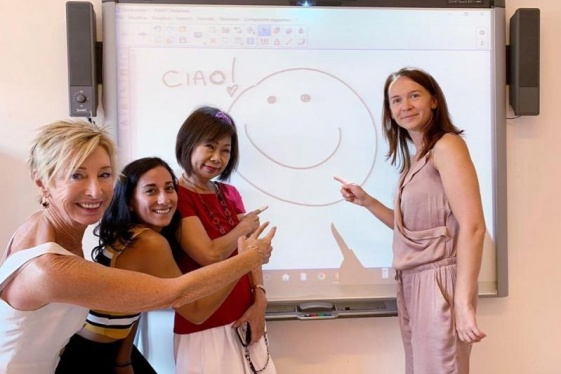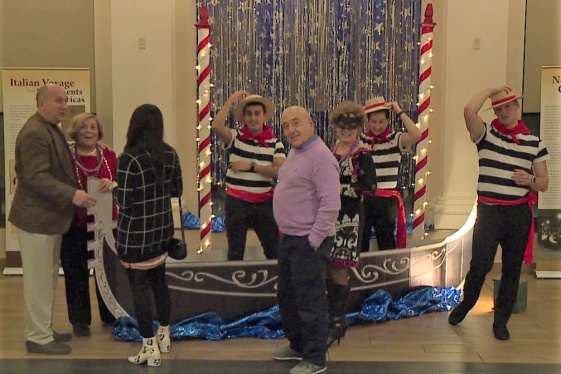

WTI Magazine #56 2015 March, 20
Author : Manuela Bianchi for learnitalygroup.com Translation by:
The word "passo" (step) is used with the verb "fare" (to do) as in "fare un passo" (literally, to do one step) or "fare due/quattro passi" (which in Italian means "to take a walk"). Even with such a simple word, we find plenty of common sayings with a figurative meaning. Let's briefly take a look at some of them.
To say that we do something quickly we have the expression "a grandi passi" (with big steps); and if one thing/action must be done slowly we can say "passo passo" (step by step) or "un passo alla volta" (one step after another). If we do progress in doing something we say we do "passi in avanti" (we are going forward) if instead we made a mistake we use to say that we have done "un passo falso" (a misstep). When we go back to our previous path and start over from the beginning changing something we can use the expression "tornare sui propri passi" (backtrack). Sometimes it happens to do more than what our possibilities can allow, and in this case we can claim to have made "il passo più lungo della gamba" (to bit off more than one could chew).
The "passo", formerly used as a unit of length, is used today in expressions that indicate the distance. For example, we can say that a friend of ours lives "a pochi passi" (few steps afar) from us, as to say within walking distance. With extensive meaning you can go "di pari passo" with someone or something in the sense of going at the same pace or speed, while being modern can be expressed with living "al passo coi tempi". When someone fails to have a certain performance is said that he/she "non tiene il passo" or "non sta al passo".
Finally, referring to speed we can say "allunga il passo" when we incite someone to go faster, while with respect to vehicles slowing down because of traffic jams or other causes, we say that the vehicle goes "a passo d'uomo" (as to say, at the speed a man can reach by walking). It's funny that when we refer to people slowing down for any cause, we don't use the expression "a passo d'uomo", but "a passo di lumaca" (as to say, at the speed a snail can reach by crawling). It definitively is a matter of points of view!
Common errors and common horrors: the use of "piuttosto che".
Until now we have often focused on the most common errors of those who are studyin the Italian language in some of the many Learnitaly offices to take a look at rules and customs of our idiom. But are the students of Italian as a second language the only ones to make mistakes? Of course not. That's why today we will be self-critical and see which common mistakes happen in the community of Italian born speakers.
The first big mistake concerns the proper use of "piuttosto che" (rather than). It is an expression often used with a disjunctive value, instead of "o" (or). It happens to be wrongly found in phrases like "Domenica andrò al mare piuttosto che in montagna" (Sunday I'll go to the beach or to the mountains).
Yet, the real meaning of "piuttosto che" is another one: the equivalent to "invece che" (instead of), which is used when we introduce a comparative or adversative sentence. So, all those journalists, professors, authorities who use "piuttosto che" in their speeches with a disjunctive meaning, are actually wrong. Using the Italian language in the right way, if we say "Domenica andrò al mare piuttosto che in montagna" we actually mean "Sunday I will go to the beach rather than to the mountains": I haver decided to go to sea instead of going to the mountains, I am not saying that either I will go to the beach or to the mountains.
Let's pay attention and let's not be deceived. Errors can be everywhere and we simply have to learn to recognize them.
You may be interested
-
Italian world language teacher 2015-2016
FRAMINGHAM PUBLIC SCHOOLS - JOB DESCRIPTION TITLE: World Language Teacher - Italian...
-
'Italy Stay Strong': What The Coronavirus Eme...
On the northern coast of Sicily, looking out toward the magnificent Aeolian Islands, Milaz...
-
‘Carnivale’ doubles as event to persuade YSU...
Lent begins next Wednesday but the Italian community of Youngstown celebrated their own Ma...
-
‘Il Canto degli Italiani’: What the Italian n...
The Italian football team and its fans are known for belting out rousing renditions of the...
-
‘In Other Words’ review: Jhumpa Lahiri’s love...
By Howard Norman Jhumpa Lahiri lived with her family in Rome in 2012. Though she...
-
‘Let’s Choose Three Words’: the Project dedic...
‘Let’s Choose Three Words’ is a new educational project promoted by the Ministry of Foreig...
-
‘Living in Rome’ talk accompanies Italian din...
An Italian Dinner and Talk on "Living in Rome: Duties, Distractions and Delights" will be...
-
‘Sons’ save Primavera program
A community program providing supplemental education in a foreign language to community ch...










